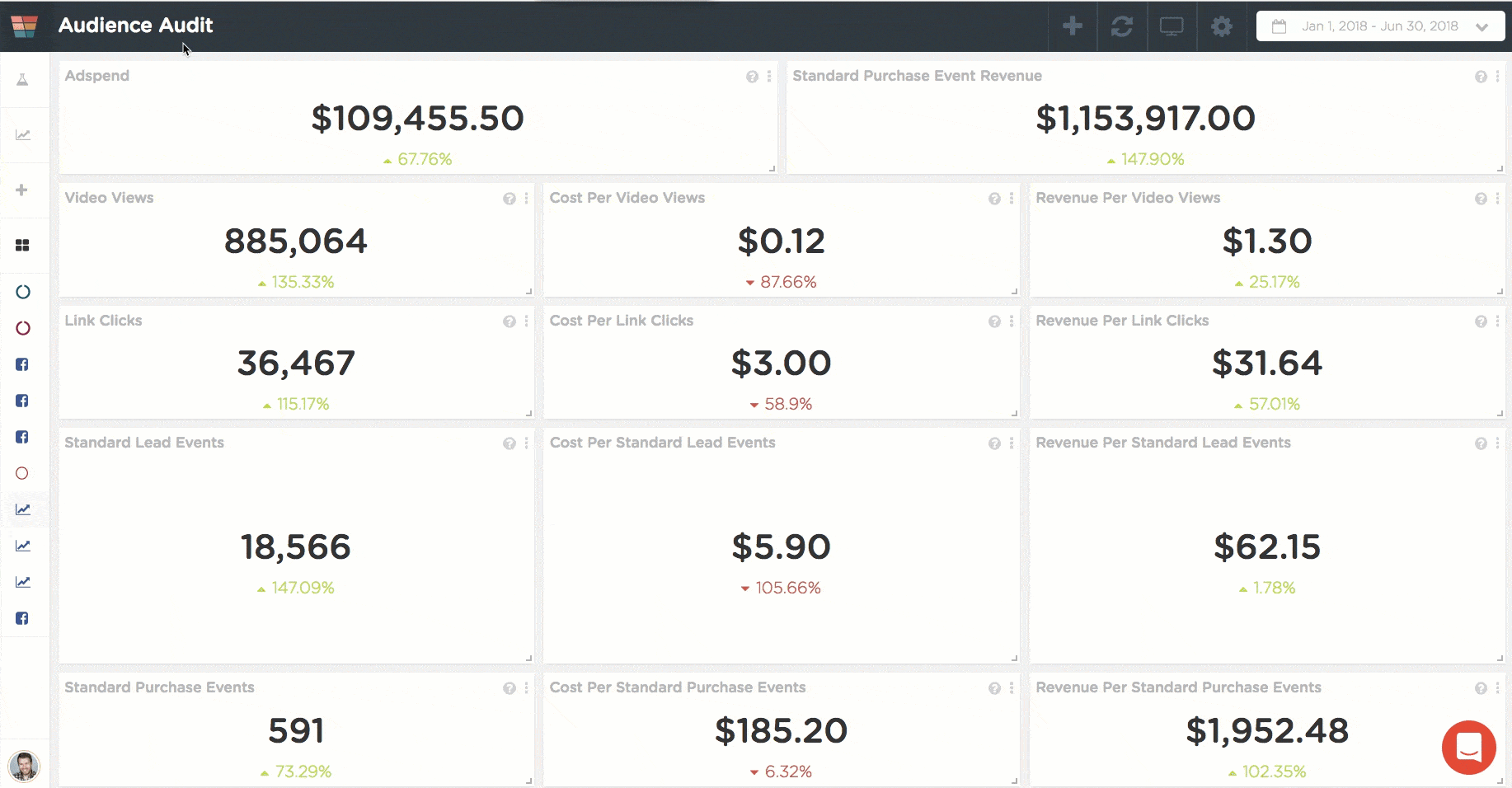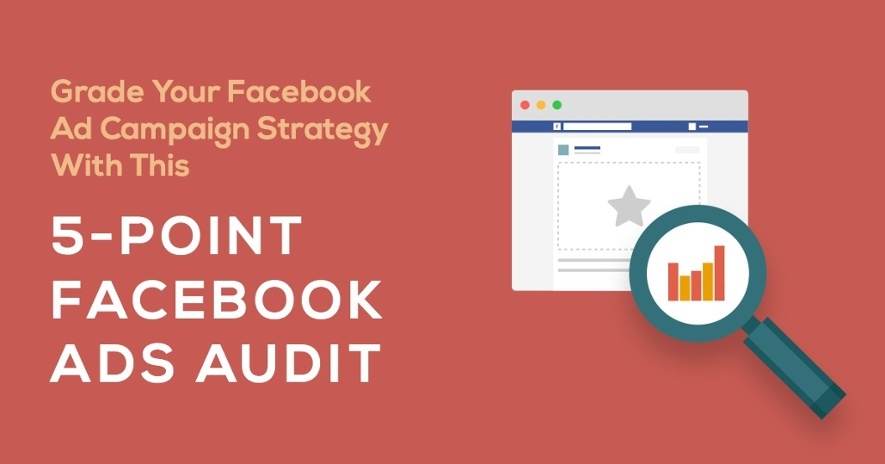If I audited your Facebook ad strategy right now would it pass with flying colors or fail miserably?
I’m personally a big fan of having expert marketers audit my funnels, ads, copy, and automation on a regular basis. It’s the fastest and easiest way to get a ton of fast, actionable tactics to increase my marketing ROI.
FunnelDash provides monthly funnel and paid media metrics audits for our Enterprise clients. This plan is quickly becoming our most popular, among FunnelDash users.
Let’s take a closer look.

But before we get into the 5-point checklist, you might be asking yourself….
What Exactly Is a Facebook Ads Audit?
Normally, the word “audit” makes people cringe in fear that they’ll be financially penalized. But we’d like to re-frame and re-focus the meaning a bit.
For anyone involved in marketing a product or service, a Facebook advertising audit can show them areas of distinct, near-immediate improvement.
If your ads are getting a tepid response from prospects or if you aren’t getting the traction you’d hoped for, a Facebook advertising audit can show you what should be adjusted or changed so that you can start getting the results you want from this lucrative social network.
What’s Included in a Facebook Ads Audit?
It’s important to note that there is no one size fits all approach for Facebook advertising audits. That’s because no two businesses are completely alike. They all have their own needs, goals and budgets, so you can’t exactly paint them with a wide swath of broad suggestions.
What we can tell you is that there are a few things that all successful campaigns – large and small – have in common; things that a Facebook advertising audit can reveal, such as:
Audit Element #1: Accurate Reporting & Tracking
It’s vital that all of your ads are named consistently and in a way that’s understandable. Naming an ad something like FBProspects1 will tell you nothing, especially as you continue advertising over time.
Instead, we recommend that you include specific details in your Facebook ad campaign names such as the name of the creative being tested, the demographics of the audience, the device being targeted, and so on.
You also need to use consistent delimiters in your naming conventions. That way, when you export your information into an Excel spread sheet, you can split each of those attributes out into separate columns. Then you’ll be able to see which ads are performing best for each attribute.
This will help you make informed decisions on how well (or not) an ad is performing. You’ll know exactly what was being tested, when and on whom.
It’s vital that, no matter which naming conventions you choose, they carry over to your automation. This is especially true in terms of tagging. Doing this lets you go back and review over time which ads got you the highest click-through rate, when you’re exporting data into your Excel pivot tables and analyzing your ad performance via the API.
Audit Element #2: Effective Bid Management
If you’re still bidding for cheap leads or clicks then this is a big red flag!
Many customers still look at Facebook purely as a lead generation tool rather than a full-fledged retargeting and customer acquisition tool. That’s why in most of the audits we’ve done, a great deal of attention has gone toward the top of the funnel, rather than the juicy center where the conversions happen.
It’s fine to want to fill your funnel with prospects – but it gets costly over time (see the next heading below for details on how to deal with that). What you want with a Facebook advertising audit is to determine which actions and targets will bring you a greater return on your ad spend. That way, you’re not just skimming the surface for leads.
If two advertisers are bidding on the same person in the ad auction, Facebook determines who wins by calculating the total bid.

Image courtesy of Facebook Blueprint
First, regardless of what a particular advertiser is bidding on, whether it be clicks or impressions or conversions, their bid is converted to an effective CPM or cost per mille bid.
Then, ad relevance scores are taken into account, positive feedback (like, shares,), negative feedback (post hides or page reports), and expected engagement (clicks).
Your total bid is the sum of your eCPM bid and your ad relevance factors.
Here are examples of how total bid is calculated for different objectives:

Image courtesy of Facebook Blueprint
If you’d like to reach more people in your key audiences on Facebook, and do it without increasing costs (increasing your bid), then use these equations to pinpoint areas of possible improvement (CTR, CVR, relevance score). If any of these metrics go up, you’ll be able to reach more people in the ad auction and keep costs low.
Instead, you get much more efficient results by bidding deeper in the funnel as opposed to just clicks and leads. You want to change your focus to bidding for customers, event attendees and so on. Just make sure you have enough data for the pixel to make this work.
How much is enough? You need 20 conversions per day which adds up to around 200+ conversions per month.
Don’t bid on opt-ins. Instead, deeper funnel conversions people might bid on for different verticals are webinar attendees for info marketers, trials for software marketers, sales page visitors, buyers, upsell buyers, and so on.
Audit Element #3: Proper Campaign Objectives
Of course, the question then becomes, “how do I get away from the CPL (cost-per-lead) mindset?” The days of spending a couple bucks to generate more engaged leads are over. Facebook advertising has become a hotbed for serious advertisers.
To create scalable, sustainable growth over time, you’ll need to refocus your efforts on ROAS – Return on Ad Spend.
To put it simply, you’ll want to limit your campaign objective for prospecting to conversions in most instances. Avoid spending money on traffic objective for cold traffic. As a general rule of thumb, if you want conversions, bid on conversions.
Audit Element #4: Proper Use of Lookalike Audiences
Lookalike audiences are a highly lucrative way to test your ads and they play a substantial role in maximizing your ad targeting. Many of our customers have defined their audiences well. But when we perform the Facebook ads audit, they see their audience’s response has been lukewarm at best. As a result, they may decide to seek out other audiences with different interests – but this can lead to a lot of wasteful spending.
Instead, we recommend creating specific lookalike audience segments using a proven targeting sequence, while excluding certain groups. That way you don’t bombard your existing audience with so many ads they become ambivalent about you or worse – aggravated.
There are lots of different options for lookalikes, and there are ways to mitigate the “ad overwhelm” so that you’re targeting people that are similar to – but not an exact match for – your target audience.
Should you choose to have a Facebook advertising audit performed, we’d be all too happy to give you clear, concise recommendations that fit your specific needs, ad budget and advertising goals.
Just click on the button below to sign up for your free 14-day trial account of FunnelDash. Click on the “Free Trial” button on the next page to get started.
Keep in mind that you're not targeting just one list and one lookalike audience. They're all going to be different. For instance, your webinar participants are a lookalike audience, your free trials are a lookalike audience, etc.
And judging by the criteria Facebook uses to determine lookalikes, don't determine your audience solely by interest. Interests are typically the worst-performing indicator we've seen and are a very dated marketing strategy that won't get you the ROI you've hoped for.
Audit Element #5: Proper Segmentation
While we’re on the topic of ad segmentation, it’s worth learning about the affinities of your audiences and lookalikes as well. Facebook Insights can divulge a wide variety of options that help you better define and target your audience using the kind of mindset and targeting that most appeals to them. This can include particular speakers and groups, magazines, websites and other likes.
Get The Information You Really Need with the Facebook Ads Audit Dashboard

FunnelDash's Facebook Ads Audit Dashboard gives you deep, meaningful information about who's clicking and converting. You can look at your Facebook ads segmented by age, gender, country, time of day, campaign objective, device platform and impression device to get the full picture, as well as the granular details you need for the results you want.
At the beginning of the campaign, you'll want to optimize your ad spend toward the segments that give you the cheapest clicks and leads, but by the end, you'll want to upgrade that focus and funnel traffic to the segments that give you the best click-through rates. We like to aim for a CTR of 2-3% on desktop and 4-5% on mobile, respectively.
The point of a Facebook advertising audit is not just to show you what you could be doing better, but could have a ripple effect on other aspects of your marketing too.
See the Impact Your Ads are Having
When you combine a Facebook ads audit with the full picture of information that you get from your FunnelDash dashboards, you’ll be able to see the impact that your advertising has on other areas of your business as well, including:
- How long it takes before a customer effectively “pays” for themselves in terms of the ad spend used to convert them versus when they actually made a purchase.
- How much of a return you’ve generated from your ad spending – both in recent months as well as historically. Are you spending more or less for the same quality of leads today than you were when you started? What can you do to change course and reach more engaged customers at a lower cost?
The bottom line is that a Facebook audit can easily pay for itself well into the future by giving you detailed, personalized recommendations that can make a significant difference in your revenue as well as improve the overall quality of your sales funnel. It’s a smart step toward wringing every drop of profitability and loyalty from your customers and fans alike – and there’s no better time to start than right now.
Find out how your campaigns are doing, and how your agency can get more clients who will pay $2,000 - $5,000 a month to have you run their Facebook ad campaigns when you sign up for a free, 14-day trial of FunnelDash.
Click on the button below to get started.
How Do You Track Your Facebook Ad Performance?
Tell us about it in the comments.


